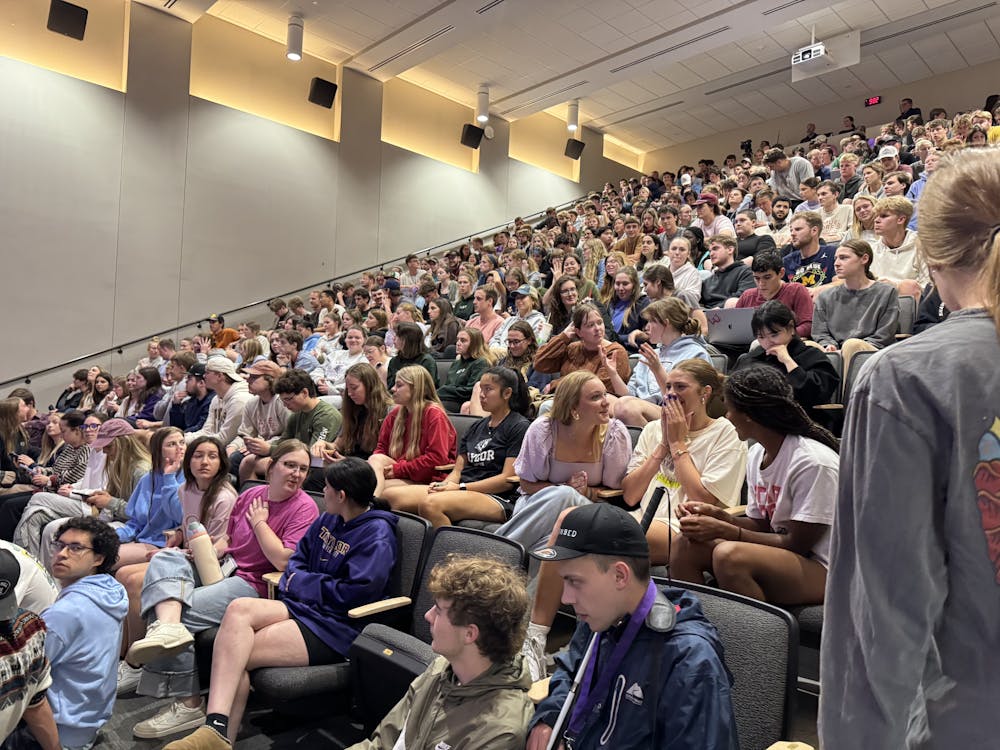President Lindsay asked 150 upperclassmen to consider moving to apartments this fall to make room for the 697 incoming freshmen in a town hall meeting in Cornwall Auditorium on Tuesday, May 6.
The auditorium was so packed two rows of students had to sit on the floor. Lindsay faced rumbles of dissent, loud applause and scattered moans as the night wore on.
Lindsay was joined by two administrative members, Skip Trudeau, vice president for student development and intercollegiate athletics, and Angie Long, university registrar. They fielded questions from students on how Taylor’s infrastructure would keep pace with ballooning enrollment and what that growth might mean for the university’s tight-knit residential culture.
“I’m not asking a single one of you to give up your Taylor experience,” Lindsay said. “I am, however, asking some of you to consider sacrificing to make that experience possible for others.”
He said Taylor University has a long history of making sacrifices during seasons of growth, beginning in 1960, when the university embarked on its first development plan.
Taylor had to expand to both carry out its mission of developing servant leaders and to respond to socioeconomic factors. He said next year will mark the last crop of freshmen born before the 2008 recession, which lowered the U.S. birthrate and is about to create a massive enrollment slump for universities nationwide.
Studies have shown that colleges need at least 2,500 students to operate efficiently — a goal he hopes to reach within the next few years, Lindsay said.
Lindsay’s long-term goals include staying at the university until 2046 and building a chapel that will be able to fit 3,500 staff and students. He said the growth will be “slow” and “incremental,” and the university will not seek to beat the current growth rate.
Trudeau stressed the university will not compromise its core values as it expands to receive more students. The “missional fit” of the incoming freshmen is the best he’s seen in 26 years, he said.
Nor is Taylor compromising on its academic standards. Lindsay said the 2024 freshman class boasted an average GPA of 3.87 when many universities are lowering standards to boost enrollment numbers.
Lindsay and Trudeau encouraged students to visit the new Taylor-owned apartments, the Haven on 2nd Street. It is located four minutes outside campus. Other housing alternatives include apartment-style buildings like Casa, Delta and the Residential Village.
Although a taskforce has been formed to build another residence hall, the dorm will not be complete for another two years, Lindsay said.
The current plan is to build a residence hall with enough room for 150 to 175 beds. From there, they will assess the situation before deciding to build a second dorm, Trudeau said.
In response to questions about how non-dorm housing may disrupt the culture of freshmen and upperclassmen living in the same space, Lindsay said he’s working on implementing a program where students maintain a connection with their dorm after moving to an apartment. However, he did not give specifics.
“We believe it’s possible to stay deeply connected to your residence hall communities while creating new traditions and community in apartment-style accommodations your senior year,” he wrote in a follow-up email to students on May 5.
Waitlists for courses are another adjustment to a growing student population. She suggested students add themselves to waitlists for up to four classes, because spots will likely open up. Waitlisted students will receive an email if the class opens up, giving them 48 hours to decide whether or not to join the class.
During the last peak in enrollment — 2009-2010 — under 2,000 undergraduate students shared a campus with far less infrastructure, Lindsay said. Most seniors were expected to live off campus. Enrollment has since grown to just over 2,000 students, but with the added benefits of two residence halls, a residential village and significantly expanded dining options, including Zondy’s, Chick-Fil-A and Freshens.
Sophomore Evan Smith said Lindsay and Trudeau should be commended for putting themselves in the line of fire by hosting a town hall.
“I appreciate their humility,” he said. “It’s going to be a little messy next year, but we can all work together.”’
Junior David Musser said that while the administration did a good job detailing the practical aspects of growth, he thought some of their answers were lacking.
“I ultimately think that the administration is underestimating the degree of cultural transformation that is likely to occur as a product of growth,” he said. “I’m of the perspective that the Taylor formula may be more fragile than we think.”




